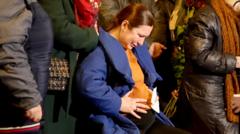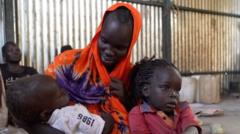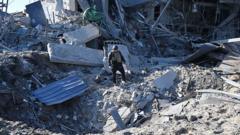The ongoing conflict in Ukraine weighs heavily on grieving families and weary soldiers, who question the possibility of achieving a peaceful settlement while grappling with the harsh realities of war and its toll on the nation.**
Disquiet in Ukraine as Soldiers Strive Amidst Growing Calls for Peace Talks**

Disquiet in Ukraine as Soldiers Strive Amidst Growing Calls for Peace Talks**
An emotional account reflects on the challenges faced by Ukrainian soldiers and families amidst shifting perspectives on the ongoing war and potential negotiations.**
In the somber atmosphere of St. Michael’s Cathedral in Kyiv, a young mother mourns her lost husband, Andriy Kusmenko, a marine commander killed in action, leaving behind a daughter who will never know her father. Anastasiia Fedchenko’s wails resonate within the cathedral, as her deep bereavement contrasts sharply with the hollowing words echoing throughout Ukraine: "This war will last as long as Russia does." This sentiment reflects a growing dread that future generations may inherit these grievances, compelled to fight similarly.
Conversely, former President Donald Trump is re-emerging in the political landscape, advocating for immediate peace talks between Ukraine and Russia. This notion has sparked resistance among those who believe that compromising with Russia would disrespect the sacrifices of soldiers like Andriy. Soldier Dmytro, who fought beside Andriy, articulates his disdain for talks that bypass the valor of the fallen, declaring the need to continue the fight for those who died defending Ukraine.
As the conflict enters a challenging third winter, the notion of "victory" is becoming increasingly muted. Once an inspiring rallying cry when Russia's full-scale invasion commenced, it now feels out of reach, with significant territory lost to Russian control, including Crimea. Many Ukrainians are grappling with the duality of rising casualties and a growing public discourse calling for a potential resolution to the conflict.
Legal tensions mount as hundreds of thousands of cases surface against soldiers who have deserted the front lines. In a court in Dnipro, Serhiy Hnezdilov stands trial for desertion, voicing a widespread fatigue with the war and demanding a structure for service termination that has remained elusive. He emphasizes a commitment to Ukraine, distinguishing his readiness to fight from being treated unjustly by military leadership.
On the front lines, soldiers like Mykhailo, a drone unit commander, persist in their duties, preparing for aerial combat in the crucial eastern city of Pokrovsk. The ongoing threat from Russian advances juxtaposes their efforts to maintain some semblance of control over the territory. Between fear and exhaustion, Mykhailo reflects on both his waning belief in a peace deal and the ongoing toll the war takes on Ukraine's populace.
As Ukraine navigates these complex realities, the presences of both the combatants and their families shed light on the ongoing conflict’s human cost. Mykhailo expresses skepticism about a potential peace agreement under current leadership both in Ukraine and Russia, anticipating that any silence in gunfire might only be a temporary measure before renewed aggression.
In this challenging landscape, Ukrainians confront not only the toll of their ongoing war but also the implications of external political dynamics, particularly as Trump’s administration emerges with a new angle towards potential dialogue with Russia, which many fear could come at a detrimental cost to Ukraine's future.
Conversely, former President Donald Trump is re-emerging in the political landscape, advocating for immediate peace talks between Ukraine and Russia. This notion has sparked resistance among those who believe that compromising with Russia would disrespect the sacrifices of soldiers like Andriy. Soldier Dmytro, who fought beside Andriy, articulates his disdain for talks that bypass the valor of the fallen, declaring the need to continue the fight for those who died defending Ukraine.
As the conflict enters a challenging third winter, the notion of "victory" is becoming increasingly muted. Once an inspiring rallying cry when Russia's full-scale invasion commenced, it now feels out of reach, with significant territory lost to Russian control, including Crimea. Many Ukrainians are grappling with the duality of rising casualties and a growing public discourse calling for a potential resolution to the conflict.
Legal tensions mount as hundreds of thousands of cases surface against soldiers who have deserted the front lines. In a court in Dnipro, Serhiy Hnezdilov stands trial for desertion, voicing a widespread fatigue with the war and demanding a structure for service termination that has remained elusive. He emphasizes a commitment to Ukraine, distinguishing his readiness to fight from being treated unjustly by military leadership.
On the front lines, soldiers like Mykhailo, a drone unit commander, persist in their duties, preparing for aerial combat in the crucial eastern city of Pokrovsk. The ongoing threat from Russian advances juxtaposes their efforts to maintain some semblance of control over the territory. Between fear and exhaustion, Mykhailo reflects on both his waning belief in a peace deal and the ongoing toll the war takes on Ukraine's populace.
As Ukraine navigates these complex realities, the presences of both the combatants and their families shed light on the ongoing conflict’s human cost. Mykhailo expresses skepticism about a potential peace agreement under current leadership both in Ukraine and Russia, anticipating that any silence in gunfire might only be a temporary measure before renewed aggression.
In this challenging landscape, Ukrainians confront not only the toll of their ongoing war but also the implications of external political dynamics, particularly as Trump’s administration emerges with a new angle towards potential dialogue with Russia, which many fear could come at a detrimental cost to Ukraine's future.






















